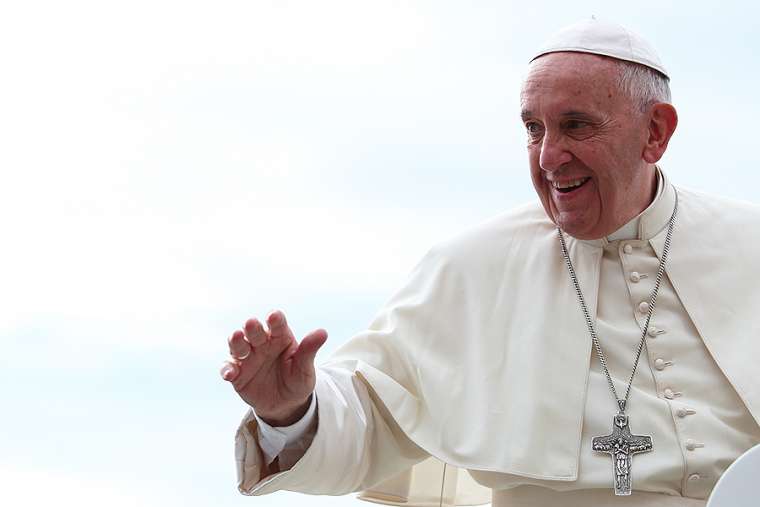Praying for Pope Francis on His Fifth Anniversary
COMMENTARY

Five years ago, I stood in the refectory of St. John Vianney Seminary of Denver, with colleagues, friends and a few hundred seminarians, watching on television as a much larger crowd gathered in St. Peter’s Square. When Jorge Mario Bergoglio, now Pope Francis, appeared on a balcony above the square, we erupted into cheers, and then we fell silent as the pope asked the world to pray for him and offered us his blessing.
From there, we went to “Francis Fest,” a rally at the State Capitol organized by friends, and then to Mass, where we prayed for Francis, as he had asked. We kept the party going at a nearby Argentine restaurant, eating chimichurri pizza and toasting our new pope.
From the beginning, the Pope has inspired me and my family. When his simplicity of life and love for the poor became obvious, our family decided to donate to the poor some things we loved, in his honor. We tried to give from our need, as he seemed to do, instead of from our excess. His emphasis on “accompaniment” has transformed our approach to evangelization, and his thought on “ideological colonization” and the “existential peripheries” has called me to greater solidarity with marginalized people and communities.
Last year, I had the opportunity to meet Pope Francis and talk with him for a few minutes. I was awe-struck by the experience of standing before St. Peter’s successor — touched by the continuity of the papacy and the Lord’s guidance and protection of his Church. And I was struck by the Pope’s pastoral attention: In broken Spanish, I asked him to pray for our family and thanked him for his love for people with disabilities. When our short conversation ended, I knew that he had heard and understood me, and I was moved.
The Pope has also confounded me. I’ve struggled to understand his theology and approach to canon law. I’ve not always seen the continuity between his perspective and the doctrine of the Church. And I’ve lamented the division, and scandal, that some issues during his papacy have caused. I’ve tried, as the Church calls me, to be humble, to be faithful, to discern carefully how God is calling me to serve the Church, and to trust.
The Pope has challenged me to think carefully about what the papacy is, and what it isn’t, and about how the Holy Spirit works through and for the Church. His papacy has called me, and many of us, to spiritual maturity, to a deeper faith, and to trust in the Lord’s providence.
I sometimes wonder how history will remember the papacy of Pope Francis. Of course, only time will tell.
But history will certainly remember that Francis is the 265th successor to St. Peter, the 266th Vicar of Christ. The papacy is a gift to the Church, a witness of our unity, our continuity with those who have come before us, and a sign that the Lord — who promised that the gates of hell would not prevail against the Church — keeps his promises. History will remember that Francis has continued the chain of leadership begun with Peter, called by Christ to be head of the Church. It will remember that Pope Francis worked to respond to that call: to teach, govern and sanctify the Body of Christ.
On today’s anniversary of his papacy, our family will celebrate with empanadas and Argentine wine. We’ll toast Pope Francis and his ministry. We’ll take a few minutes to examine our lives and to consider how we can better love, as he does, those on the margins, the “existential peripheries.” We’ll thank God for the gift of the papacy. And just as he asked us to, we’ll pray for our pope. I hope that you will, too.
JD Flynn is editor in chief of Catholic News Agency.
- Keywords:
- jd flynn
- papacy
- pope francis

















